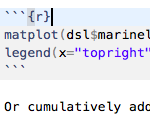Nils Reiter
DramaAnalysis 2.0.0

We have just released a new version of our R package for the quantitative analysis of plays, and want to highlight a few changes here. In QuaDramA, the R package is used for data analysis, after natural language processing has taken place. The package therefore relies on pre-processed corpora.
The most important change is the way we handle primary data. Before, dramatic texts were loaded from UIMA XMI files. Since most of the code to handle these files is written in Java, we included the R-package rJava and some Java code. While this works, it made developing the package quite tedious, and also the data files were huge and inaccessible.
Since version 2.0.0 of the package, all data is loaded from good, old CSV files. The files are much smaller, such that they can be distributed via git repositories (TextGrid, GerDraCor, theatre classique). The R-package no longer includes Java code, which also facilitates installation. And, finally, the CSV files are much easier editable by hand, making it easer to reuse our package for other purposes.
We also significantly expanded the information that is generated by default from the report() function. This function creates an HTML file that contains many basic analysis steps in an easily accessible fashion. An example report for Lessings Miß Sara Sampson can be seen here.
Installation
The package is available on GitHub: quadrama/DramaAnalysis and can be installed directly in R:
install.packages("devtools")
devtools::install_github("quadrama/DramaAnalysis",
build_vignettes = TRUE)
Documentation
Documentation is available directly in R
help(package = DramaAnalysis)
The most important vignettes (tutorials) have also been posted in our Wiki, for instance on configuration matrices or word field analysis.
Feed invited to explore, and don’t hesitate to open issues if you have them.